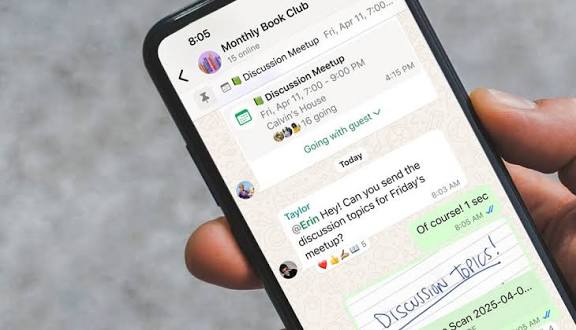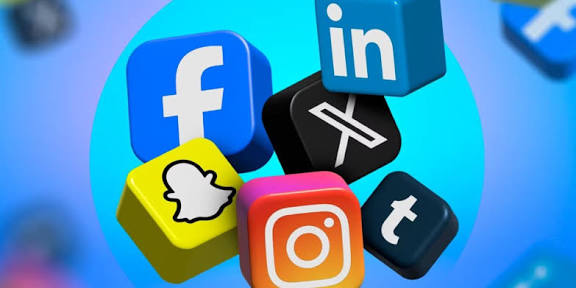Are We Becoming Our Parents? The African Habit of Forwarding Everything

It starts the same way every morning.
You open your eyes, look at your phone, and there they are– the ten unmistakable notifications from the family WhatsApp group. You scroll through the hellos as a good manners ritual: Good morning, Have a blessed day, Jesus is Lord! And then, stuck between a Bible verse and a baby meme, you see it.

A voice note from your aunt superimposed on a badly formatted graphic.
"The UN warns of a new, fatal disease in Ghana– stay indoors!"
Your dad's reply a couple of seconds later is:
"This is serious! Share with everybody."
You have not even had time to brush your teeth yet, and your cousin has already passed it on to three other groups– "Family Worldwide," "Church Youth Forum," and "Old Boys' Association 2009."
By the time it's time for lunch, the message has crossed three borders, generated panic in five households, and become an unofficial national crisis within the family group network. A completely unfounded rumor, generated out of one unsubstantiated update, has now attained the status of a fact.
You sigh. Because you remember being the one who rolled your eyes at all of it. You used to tease your parents– those people who believed every WhatsApp prophecy, every forwarded miracle cure, every "Bill Gates is giving away free iPhones" chain letter was true.
The question hangs in the steamy morning air:
Are we becoming our parents?
The Anatomy of a Forward: Trust Over Truth
Misinformation doesn’t spread because African users are naïve. It spreads because our social networks are powered by something much stronger than logic– trust.
In African digital spaces, the sender matters more than the message.
If Aunty Funke sent it, it must be true. If Papa Kojo said it came from “a reliable source,” there’s no need for verification. If your Uncle Papi's friend "works in government," you'd best ring up CNN and have them take dictation.
WhatsApp and Facebook groups don't function like public spaces. They function like cyber compounds– digital copies of our communal courtyards where news, rumor, and anxiety all become jumbled up together.
Forwarding, then, is not just a technical action; it's a moral one. It's an act of care.
"I saw this and thought of you."
“I don’t want harm to come your way.”
“I’m looking out for my people.”
To ignore such a message feels cold– even disrespectful. In a continent where information has historically been a matter of survival, sharing is love.
The Fear Factor
Then there’s fear– the invisible accelerant that powers every viral message.
Health scares, political warnings, miracle tales– anything which screams danger or crisis instantly triumphs over reason. Warnings like "Forward to seven people or die" do not just exploit superstition; they equip fear.
Fear doesn't wait for confirmation. It demands action.
In the early weeks of COVID-19, Africans were informed through voice notes of "special herbs that cure the virus," "5G towers that spread disease," and "government officials putting poison in bread." These are weak messages that passed faster than the official announcements of the Ghana Health Service or Nigeria's NCDC– because fear always sold better than fact.
The Literacy Lag
And behind it all is a sobering truth: digital literacy has fallen short of digital access.
Millions of Africans leaped from an internet-less existence directly into one dominated by smartphones and social media. The hardware preceded the training. The result? A whole continent of first-time users navigating global platforms with the same faith mechanisms that had governed their local communities.
To most, tidily laid-out news in the guise of an emoji-packed official-sounding message is gospel. If it looks like a press release, then it must be one.
Stupidity is not the problem– haste is. The web came too fast, and critical thinking never stood a chance to get on par.
From Parents to Us– The Generational Mirror

We, the natives, were meant to be smarter.
We rolled our eyes over our parents' prayer-chain emails. We mocked their "forward to 10 people for blessings" texts. We assumed we were more clever, more quick, impervious.
But scan Twitter– excuse me, X– and you'll see what I mean: we merely altered the style. Our chain message is dispensed as a screenshot thread: "Someone close to the government just told me…"
Or a TikTok slideshow narrated by a smooth voice saying, "They don't want you to know this, but…"Or a Facebook reel labeled, “Share before they delete this!” Same psychology, same packaging.
The Boomer who posted a threat of a spooky photo is the same as the Gen Z influencer posting "insider" political rumor. Same need for belonging, same thrill in possessing the knowledge that others do not.
We call it “raising awareness,” “sharing receipts,” or “just in case it’s true.” But deep down, it’s the same reflex– the digital version of “better safe than sorry.” We haven’t necessarily become more discerning. We’ve just become more digital.
And here’s the irony: Our parents distrusted institutions but trusted individuals. We distrust institutions and individuals, but trust virality.
If it’s trending, it must be true. If everyone’s talking about it, it must matter. We've replaced our parents' religious fear with our own brand of social fear– the fear of ignorance, being left behind, or "not woke enough."
The Cultural Layer Why Africans Believe Each Other So Easily
In order to understand the African forwarding phenomenon, you must understand African trust.
Our cultures were built on word-of-mouth trustworthiness– not institutional authority. Prior to radio, prior to television, prior to governments that people could kind of trust, word-of-mouth was the ideal source of information. Your neighbor. Your elder. Your minister.
If your uncle said the market was closing early, you didn't ask for receipts. You packed up and went home.
This intrinsic reliance on interpersonal trust was survival– and it paid dividends. But in the digital age, it's a double-edged sword. When the state deceives, the people believe the street. When the news is lagging, the rumor mill works overtime.
That legacy of distrust– spawned by decades of colonial disinformation, repressive regimes, and institutional decay– lingers in collective memory. Africans discovered that the government official story was never quite the whole story. So even today, the average citizen prefers to believe his uncle's acquaintance in the ministry over the ministry itself.
And then there's religion and superstition– the emotional accelerators of misinformation.
A prophecy about a looming crisis will spread quicker than a policy paper. A "vision" from a pastor will circulate before an official health alert. The spiritual is truer because it connects with emotion, not process.
Misinformation, in this manner, is not random. It is cultural– the product of love, faith, fear, and the residual imprint of a colonial information wound.
The Digital Legacy– When Every Forward Is a Fire
A single forward might not be problematic. But blown up amongst millions of users, it's a conflagration.
People have bulk-shopped fuel or groceries due to false shortages
Villages have attacked harmless individuals after WhatsApp gossip accused them of ritual abductions.
During the COVID-19 pandemic, individuals were admitted to hospitals after consuming bleach or saltwater because a viral message claimed that it kills the virus.
The harm isn't only emotional- it's economic, political, and social.
And governments, as ever, have seen opportunity in the mayhem.
Each new crisis of disinformation gives them an excuse to justify digital crackdowns– shutting down social media "to maintain peace" or passing censorious "fake news" bills that easily suppress protest.
Journalists and activists, on the other hand, must fight up hills– spending days to counteract falsehoods which were transmitted in seconds.
There is an old saying:
A lie can travel halfway around the world while the truth is still putting on its shoes.
In Africa's experience, the lie travels via WhatsApp group. The truth, if it's lucky, reaches Facebook– much too late after the damage is done.
The Mirror Doesn't Lie
We would laugh at our parents for believing in a rumor that Bill Gates was donating money to random Nigerians. Now we retweet unverified tweets claiming Elon Musk is buying WhatsApp and charges a fee.
Same naivety, different generation– only with better graphics.
The problem wasn't them. It wasn't us. It was human nature– our compulsion to share, to connect, to look out for each other, butting up against the harsh rhythms of digital life.
We share because we care. We forward because we belong. And the tragedy is that in this new world, care without confirmation is chaos.
So sure, we may be becoming our parents. But maybe that's not so bad– maybe it's a reminder. A reminder that we're today's guardians of the digital village, and it's our responsibility to teach the next generation not just how to get connected, but how to discern.
Because if misleading information travels faster than sense, then critical thinking is the only Wi-Fi signal powerful enough to keep pace.
So before you forward that next "breaking" news alert, wait.
Check the source.
Break the chain.
Be the online grown-up your aunt already thinks you are.
You may also like...
When Sacred Calendars Align: What a Rare Religious Overlap Can Teach Us

As Lent, Ramadan, and the Lunar calendar converge in February 2026, this short piece explores religious tolerance, commu...
Arsenal Under Fire: Arteta Defiantly Rejects 'Bottlers' Label Amid Title Race Nerves!

Mikel Arteta vehemently denies accusations of Arsenal being "bottlers" following a stumble against Wolves, which handed ...
Sensational Transfer Buzz: Casemiro Linked with Messi or Ronaldo Reunion Post-Man Utd Exit!

The latest transfer window sees major shifts as Manchester United's Casemiro draws interest from Inter Miami and Al Nass...
WBD Deal Heats Up: Netflix Co-CEO Fights for Takeover Amid DOJ Approval Claims!

Netflix co-CEO Ted Sarandos is vigorously advocating for the company's $83 billion acquisition of Warner Bros. Discovery...
KPop Demon Hunters' Stars and Songwriters Celebrate Lunar New Year Success!

Brooks Brothers and Gold House celebrated Lunar New Year with a celebrity-filled dinner in Beverly Hills, featuring rema...
Life-Saving Breakthrough: New US-Backed HIV Injection to Reach Thousands in Zimbabwe

The United States is backing a new twice-yearly HIV prevention injection, lenacapavir (LEN), for 271,000 people in Zimba...
OpenAI's Moral Crossroads: Nearly Tipped Off Police About School Shooter Threat Months Ago
ChatGPT-maker OpenAI disclosed it had identified Jesse Van Rootselaar's account for violent activities last year, prior ...
MTN Nigeria's Market Soars: Stock Hits Record High Post $6.2B Deal

MTN Nigeria's shares surged to a record high following MTN Group's $6.2 billion acquisition of IHS Towers. This strategi...
